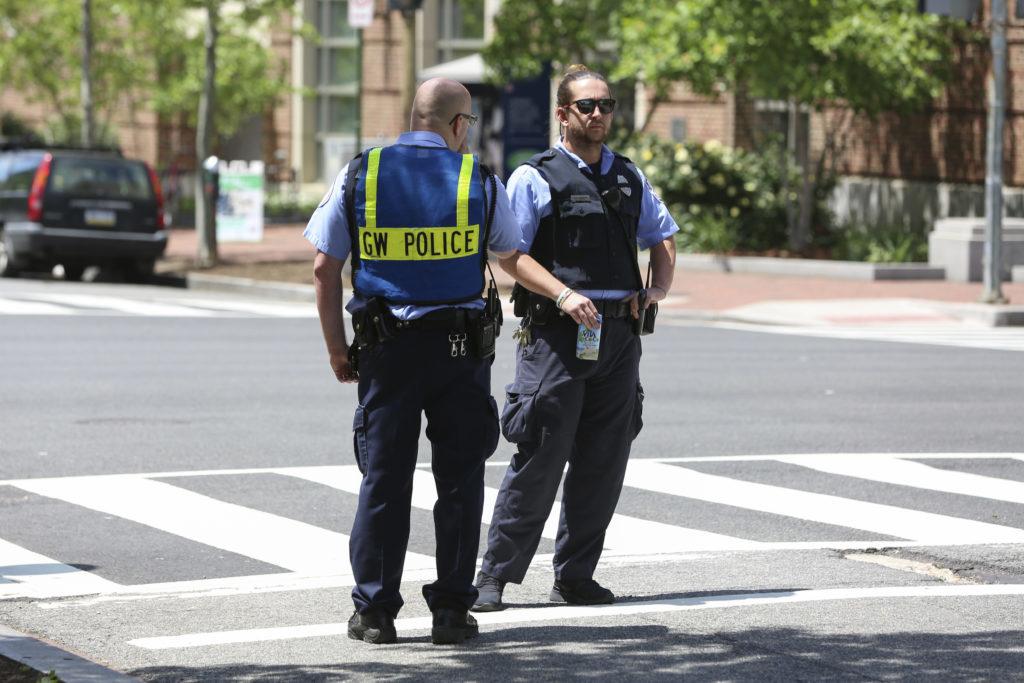Updated: August 31, 2017 at 10:03 p.m.
An area resident is suing GW and the University Police Department, claiming the University police wrongly barred him from campus property.
Virmeko Scott is seeking $10 million from the University for allegedly abusing its police powers and violating District laws that ban discrimination in public spaces, according to a complaint filed in D.C. Superior Court Monday. Scott was barred from GW property last month after a “security agent” told him that he “seemed suspicious,” according to the complaint.
The complaint states that on July 10, the security agent who provided him with the barring notice did not identify himself, did not give him a reason for being barred from campus and did not specify why he looked suspicious. Scott is a black male, according to court documents.
“I feel very threatened by the unspecified notice, it is a threatening document advanced upon me by an unknown entity,” Scott wrote in the complaint.
The complaint does not say where the alleged incident occurred. UPD is typically responsible for issuing barring notices.
The GW crime log does not include a crime that resulted in an individual being barred from campus July 10.
The complaint is also filed against GW’s Alpha Pi Epsilon chapter. Alpha Epsilon Pi was thrown off campus in 2014, amid hazing and alcohol violations but continued recruiting members underground after its removal. The chapter is no longer registered at GW.
Scott could not be reached for comment.
University spokeswoman Maralee Csellar said barred individuals can pass through campus as long as they remain on public sidewalks and properties. She said UPD has barred numerous people from campus property but declined to provide a specific number of individuals who are currently banned.
Csellar declined to comment on the case, citing a University policy not to comment on pending litigation.
The complaint states that the security agent told Scott if he was seen in public spaces “in the vicinity” of GW, then he would be arrested. A person convicted of unlawful entry can be fined up to $100, jailed for a maximum of six months or both, according to court documents and D.C. law.
The barring notice given to Scott includes several buildings within campus boundaries that are categorized as barred property, according to the notice, a copy of which was included in the complaint. He claimed in the complaint that some areas, like the Mexican Embassy and the Foggy Bottom Metro station, are included in the barred boundaries of the map – but the University’s barring policy, which is cited on the map given to him, applies only to GW-owned property.
“Please be advised that you are barred from the property of the George Washington University and that if you are found on the property again you will be subject to arrest for unlawful entry under District of Columbia,” according to the barring notice.
Scott refused to sign the barring notice, according to the complaint. He will be banned for five years unless the UPD police chief nullifies the notice, according to the complaint.
The University can bar any non-university affiliated person from campus if officials decide the individual shouldn’t be allowed access. GW can bar anyone – including students, faculty and staff – if D.C. laws or University policies are violated, according to the barring policy.
Scott is requesting the University pay him $1 million for each property that he has been allegedly barred from – including GW Hospital, the Courtyard by Marriott hotel on 20th Street, the Bosnia and Herzegovina Embassy and the International Monetary Fund building. At least two of those buildings are not included in the barred area, according to the notice, and several are properties the University does not own.
He also requests that 72 hours after the complaint is filed GW determine UPD is a police department and not a special police department, and identify all police officers and special police officers involved in his barring, according to the complaint. Special police officers work for private institutions and have limited jurisdiction.
UPD is a private campus police force.
Scott also asked GW to list every third party organization open to the public inside the University’s property and to provide documentation that GW owns the streets included in the barred area of the notice within 72 hours, according to the complaint.
The streets and sidewalks on the Foggy Bottom campus are considered public property and not subject to barring notices.
“Given George Washington University wishes to bar me from such a vast array of real estate for no apparent cause, the demands listed immediately above should not be difficult for the George Washington University to compile and provide to me,” the complaint states.
In the complaint, Scott said he will demand $1 million from the University even if GW rescinds the barring notice.
The case has been assigned to Chief Judge Robert E. Morin. Scott also applied for the court to nullify the barring notice while the case continues, according to court documents.





